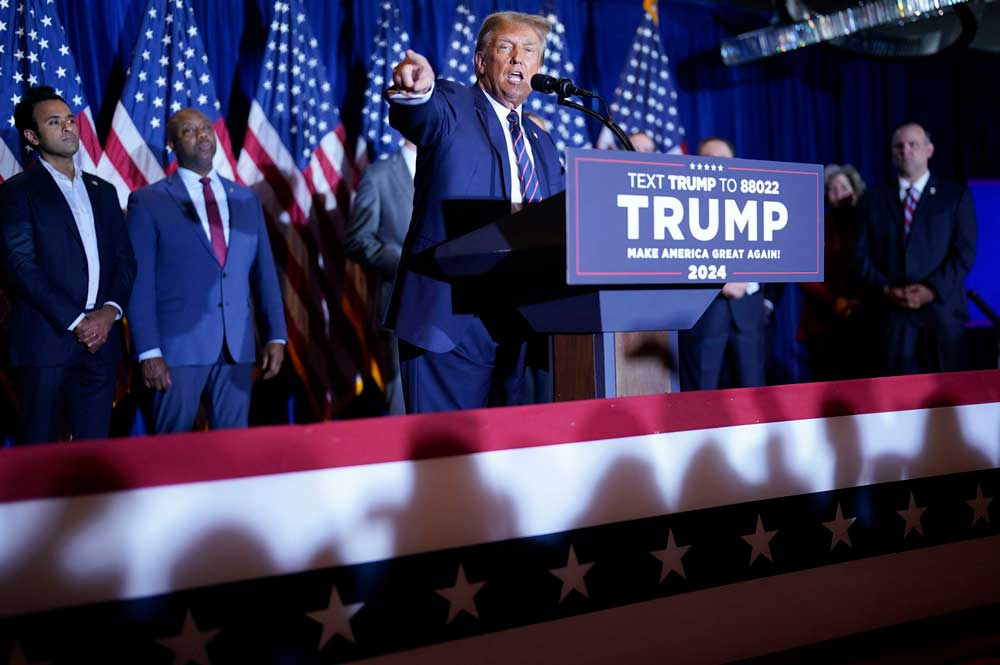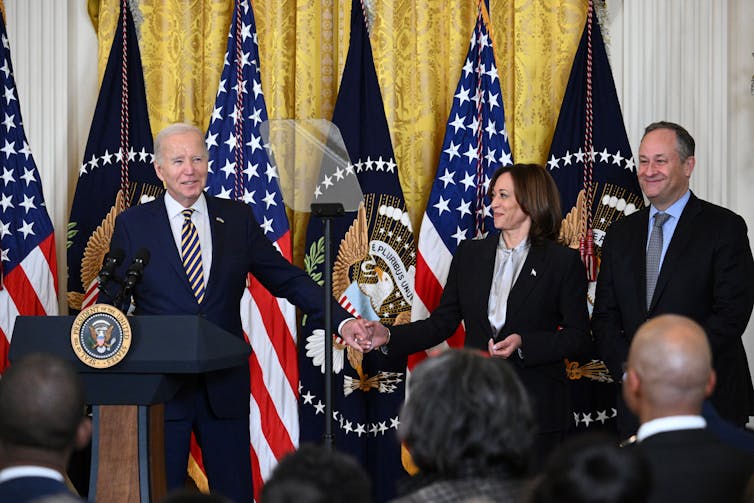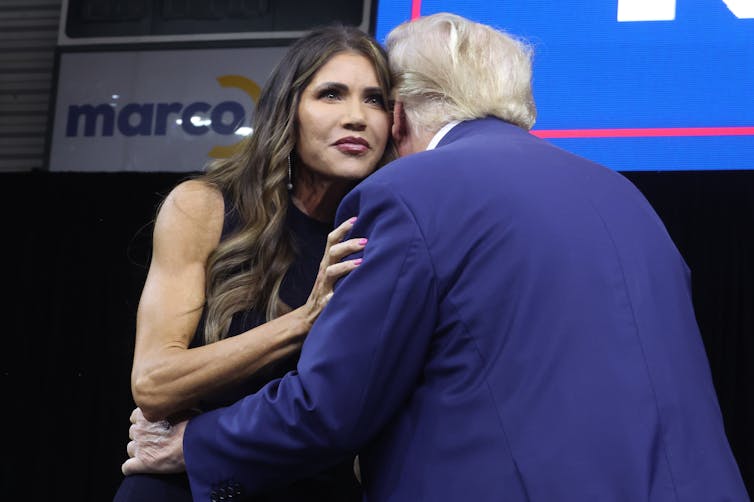
By Christopher Devine
The November presidential election is less than four months away, meaning Americans are deep in the throes of the veepstakes. You know, that favorite game of pundits, politicos and political junkies who, every four years, obsess over the presidential candidates’ choice for vice president.
The Democratic ticket is, as of this writing, President Joe Biden and Vice President Kamala Harris. No mystery there regarding the vice presidential pick. Former President Donald Trump ended months of speculation when he announced on July 15, 2024, that his running mate is JD Vance, a first-term U.S. senator from Ohio.
The 39-year-old politician rose to fame when “Hillbilly Elegy,” his 2016 autobiography about his hardscrabble upbringing in a poor, Rust Belt town in Ohio, vaulted him to the bestseller list.
Trump’s short list was reportedly narrowed down to three candidates – Vance, fellow Sen. Marco Rubio and North Dakota Gov. Doug Burgum. Trump announced his final decision on the first day of the Republican National Convention in Milwaukee.
I am a political scientist who has studied veepstakes media coverage.
The conventional wisdom is that the vice presidential pick has to be someone who can help win the election by delivering a key state or voting bloc.
But what matters most to voters, according to my research, and to the future of this country is finding someone who is well qualified to serve as vice president – and president, if necessary.

Mandel Ngan/AFP via Getty Images
What the media get wrong
Veepstakes media coverage deserves its poor reputation as little more than an electoral parlor game. Too bad: Given the vice presidency’s importance and the media’s opportunity to educate Americans about who could be next to serve in the office, it should be so much more than that. This is the conclusion from my 2023 book, “News Media Coverage of the Vice-Presidential Selection Process: What’s Wrong with the ‘Veepstakes?’”
I used data from presidential elections from 2000 through 2020 to conduct the first systematic analysis of veepstakes media coverage. For each competitive vice presidential selection process during that time – five for Democrats, four for Republicans – I studied 10 “veepstakes guides.”
This means articles or other news features from major media outlets, such as The New York Times, CNN and Fox News, profiling numerous vice presidential contenders. Typically, these profiles break down the perceived advantages and disadvantages associated with choosing a certain candidate.
Journalists and their editors decide which criteria to consider when making those evaluations. This allows me to characterize the media’s messages about what is important when selecting a vice presidential candidate.
So, if 75% of the profiles of potential Democratic running mates in 2020 mentioned age, but only 40% mentioned political experience, I would conclude that media coverage, in general, portrayed age as a more relevant selection criterion than experience.
What does the evidence show?
Veepstakes media coverage tends to focus on whether a potential running mate can help win the election – not on who can help the president govern once in office.
From 2000 to 2016, for example, 73% of the vice presidential candidate profiles referenced the candidates’ home state, race, age, gender or social class as a reason to select or reject them.
Whether a candidate was qualified to serve in the White House attracted much less attention. Just half as many veepstakes profiles – approximately 38% – discussed the candidates’ political experience, working relationship with the presidential candidate or, more generally, whether they were up to the job of being vice president or president.
In fact, I found that journalists are more likely to discuss a potential running mate’s physical appearance than whether he or she is qualified to serve as vice president.
A potential vice presidential candidate’s political or professional experience gets even less media coverage in the run-up to a close election. Only when the outcome seems like a foregone conclusion do journalists spend about as much time weighing a potential running mate’s governing capacities as their electoral appeal. Choosing a well-qualified vice president is treated as a luxury that only some presidential candidates can afford.
Unfortunately, I think the country has been seeing the same type of veepstakes coverage in 2024 as in previous elections: fevered speculation about who can deliver an election victory, with some occasional commentary on who can serve effectively as vice president.

Scott Olson/Getty Images
How to get it right
The problem with veepstakes media coverage, generally speaking, is that it overstates the vice presidential candidate’s influence on voters and understates the importance of electing a well-qualified vice president.
Vice presidents have little in the way of formal constitutional powers. They break ties in the Senate. And in what used to be a simple ceremonial function, they also open and count the states’ electoral votes after a presidential election.
They are also first in line to take over as president, if necessary.
But over the past half-century, vice presidents have gained a great deal of informal power, too. In most administrations, they serve as top presidential advisers who play key roles in many major decisions. It is therefore important for presidential candidates to choose a running mate who can help them govern once in office.
Choosing a well-qualified running mate is also a good electoral strategy. My co-author, Kyle C. Kopko, and I demonstrate this in our 2020 book, “Do Running Mates Matter? The Influence of Vice Presidential Candidates in Presidential Elections.” Voters reward presidential candidates for selecting someone with the experience necessary to serve as vice president by more favorably rating their judgment and delivering greater support at the polls.
Trump could have reaped this benefit if he had chosen Rubio or Burgum.
The opposite is true when selecting a less experienced or poorly qualified vice president in a desperate bid for votes – think Sarah Palin in 2008. That strategy backfires, as Trump might find out after choosing Vance, a freshman senator who took office in January 2023.
In short, running mates mostly have an indirect effect on how people vote by influencing what they think of the presidential candidates. Rarely does the choice of a vice president have direct or targeted effects on voting. That is to say, very few people change their vote simply because they like the vice president or come from the same state or demographic group.
The media’s role
A free press is vital to democracy in the U.S. Among other things, it can serve the American people – not to mention presidential campaigns – by helping to provide relevant information about contenders for the vice presidency before they join a party ticket or get elected to office.
Informative news articles can provide answers to the most important questions: What are the potential running mate’s qualifications? What strengths will he or she bring to the White House? If elected, would the new president and vice president work well together?
My research suggests that this is the standard to which journalists and their audiences should aspire to as Vance joins Trump on the Republican ticket. This is a consequential choice that requires serious, substantive analysis. You can pay attention to those who treat it as such – and ignore those who don’t.
![]()
Christopher Devine is Associate Professor of Political Science at the University of Dayton.





























Pogo says
@5 minutes of my life I’ll never have again
SMH
Joe D says
Vance meets all of Trumps qualifications for a Vice President:
-Male
-White
-Young
-Handsome
-Christian (Catholic actually)
-Fiercely Anti-Abortion
-Inexperienced enough not to SERIOUSLY challenge Trump on any policy (Vance has only been a Senator since January 2023).
A PERFECT MATCH…shouldn’t REALLY be a “Surprise”…he actually LOOKS like one of Trump’s SONS!
beachcomberT says
To test the professor’s argument, let’s find out what VP Harris has been doing in the past year — giving key advice to aging Biden or covering up his mental lapses??
Laurel says
BeachcomberT: Do tell us about JD Vance’s experience to become Vice President, and possibly President of the United States of America. Show us his resume, and how (who appointed him) he got to where he is now. Should be a very short read.
Jackson says
The RNC is grotesque and hateful. They don’t want to unify us. They want to divide and conquer. They demonized immigrants in a land of immigrants. I mean their nominees for President and Vice President are both married to immigrants. Their children are the children of immigrants, but their hateful, draconian policies won’t apply to them, but they will enforce them on us. MAGA will strip us of our rights and sell our country to the highest bidder.